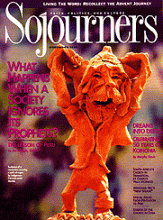In the course of a recent week, these two things happened: The Washington Post ran a front-page story blasting the investigation of last year's Tailhook Navy sex scandal; and I learned through friends that three church leaders have admitted to sexual abuse of individuals under their care.
My response was telling. I had not been surprised to learn last year that at least 26 women had been assaulted by a gauntlet of naval aviators at the Tailhook convention in Las Vegas. Though the details of what was done to the victims were appalling, such outrageous acts seemed inevitable in a military institution built on male power, hierarchy, and absolute authority.
Nor was I surprised that the investigation of the incident was plagued by stonewalling and cover-ups, and paralyzed by Navy leaders' efforts to protect senior officers and civilians who may have been involved in the scandal. What I did find astounding was that the Pentagon itself assailed the Navy leadership involved in the investigation, forcing the retirement of two top officials and the reassignment of another.
What further consequences there may be remain to be seen. But, at least for the moment, the military in this case appears to be serious about exposing and addressing sexual harassment and abuse in its midst.
It was more difficult to know what to feel about the revelation of sexual misconduct so close in the church. All three of the men involved are individuals whom I have respected and learned from--pastors and teachers of the gospel, of community, and of peacemaking.
Read the Full Article

